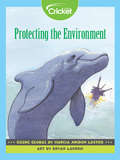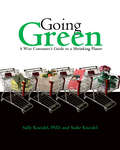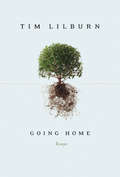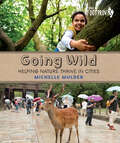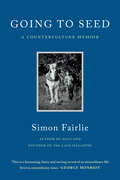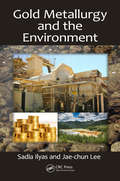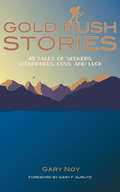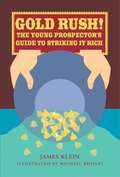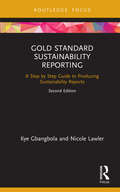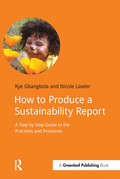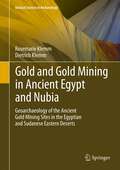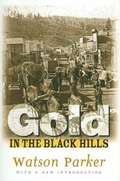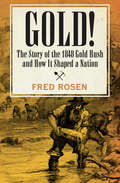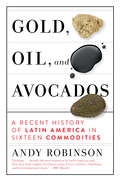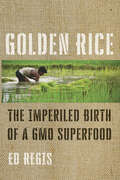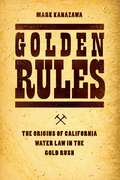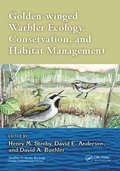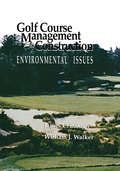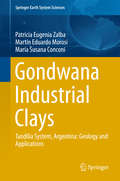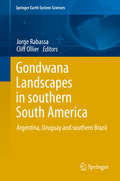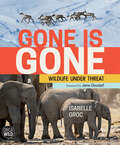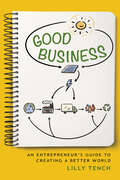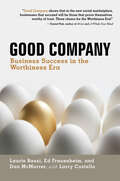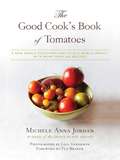- Table View
- List View
Going Global: Protecting the Environment
by Marcia Amidon LustedSometimes, preservation and conservation need to occur on a larger scale. Oceana, Greenpeace, and the World Wildlife Fund are dedicated to protecting resources all over the world—especially resources that all people share.
Going Green
by Sally Kneidel Sadie KneidelGoing Green focuses on the biggest environmental culprits of the American lifestyle--diet, housing, clothing, and transportation--and provides practical, effective steps we can take to reduce our carbon footprint and live more sustainably. Comprehensive and empowering, it will make you think twice about every dollar you spend.
Going Home: Essays
by Tim LilburnLike his contemporaries Robert Bringhurst, Ronald Wright, Dennis Lee, Don McKay, and Jan Zwicky, Tim Lilburn has long been a deep thinker on issues of ecology and writing, and on how the two fit together philosophically, morally, and ethically. In Going Home, Lilburn addresses how we relate (often uneasily) to our physical landscape in Canada and the United States.Retrieving an almost lost strand in the Western intellectual tradition -- the erotic, contemplative strand, from Plato to John Cassian to the Areopagite -- Lilburn traces a history of eros and desire in the hope that this exercise and its awakening can lead us home to a full residence in North America. Surprising and enlightening, the collection finishes with two unforgettable personal essays, where Lilburn writes about his effort to enact desire in the place where his ancestors are buried, the flatlands and coulees of southern Saskatchewan.
Going Wild: Helping Nature Thrive in Cities (Orca Footprints #12)
by Michelle MulderWhat if the new key to making our lives safer (and even healthier) is to allow the wilderness back into our cities? Going wild. We don't see it as a good thing. And why would we? For most of our time on earth, humanity has been running from lions and other wilderness dangers. We've worked hard to make our local landscapes as safe and convenient as possible. Sometimes that's meant paving over areas that might burst into weeds. Other times, we've dammed rivers for electricity or irrigation. But now pollution, climate change and disruptions to the water cycle are affecting the world in ways we never anticipated. The epub edition of this title is fully accessible.
Going to Seed: A Counterculture Memoir
by Simon FairlieAn unforgettable firsthand account of how the hippie movement flowered in the late 1960s, appeared spent by the Thatcher-consumed 1980s, yet became the seedbed for progressive reform we now take for granted—and continues to inspire generations of rebels and visionaries. "Fairlie has a refreshingly declarative style: he’s analytical, funny and self-aware. . . His memoir has much to offer anyone interested in movement history or in the future of intentional communities."—Elizabeth Royte, Food & Environment Reporting Network At a young age, Simon Fairlie rejected the rat race and embarked on a new trip to find his own path. He dropped out of Cambridge University to hitchhike to Istanbul and bicycle through India. He established a commune in France, was arrested multiple times for squatting and civil disobedience, and became a leading figure in protests against the British government’s road building programs of the 1980s and—later—in legislative battles to help people secure access to land for low impact, sustainable living. Over the course of fifty years, we witness a man’s drive for self-sufficiency, freedom, authenticity, and a deep connection to the land. Fairlie grew up in a middle-class household in leafy middle England. His path had been laid out for him by his father: boarding school, Oxbridge, and a career in journalism. But everything changed when Simon’s life ran headfirst into London’s counterculture in the 1960s. Finding Beat poetry, blues music, cannabis and anti–Vietnam War protests unlocked a powerful lust to be free. Instead of becoming a celebrated Fleet Street journalist like his father, Simon became a laborer, a stonemason, a farmer, a scythesman, and then a magazine editor and a writer of a very different sort. In Going to Seed he shares the highs of his experience, alongside the painful costs of his ongoing search for freedom—estrangement from his family, financial insecurity, and the loss of friends and lovers to the excesses and turbulence that continued through the 70s and 80s. Part moving, free-wheeling memoir, part social critique, Going to Seed questions the current trajectory of Western “progress”—and the explosive consumerism, growing inequality, and environmental devastation laid bare in our daily newsfeeds—and will resonate with anyone who wonders how we got to such a place. Simon’s story is for anyone who wonders what the world might look like if we began to chart a radically different course.
Gold Metallurgy and the Environment
by Sadia Ilyas Jae-chun LeeThis book gives an overview of all the gold extraction processes along with their mechanistic study and environmental impact. Reviews extraction techniques previously employed as well as recently evolved technology for gold leaching, provides technical flow sheets for processing of ores with a diversity of lixiviants and offers a compulsory overview of every gold processing technique It also discusses recent integrated techniques including hydro- and bio-metallurgical techniques with examples
Gold Rush Stories: 49 Tales of Searchers, Scoundrels, Struggle and Serendipity
by Gary NoyThis volume explores the deeply human stories of the California Gold Rush generation, drawing out all the brutality, tragedy, humor, and prosperity as lived by those who experienced it. In less than ten years, more than 300,000 people made the journey to California, some from as far away as Chile and China. Many of them were dreamers seeking a better life, like Mifflin Wistar Gibbs, who eventually became the first African American judge, and Eliza Farnham, an early feminist who founded California's first association to advocate for women's civil rights. Still others were eccentrics—perhaps none more so than San Francisco's self-styled king, Norton I, Emperor of the United States. As Gold Rush Stories relates the social tumult of the world rushing in, so too does it unearth the environmental consequences of the influx, including the destructive flood of yellow ooze (known as “slickens”) produced by the widespread and relentless practice of hydraulic mining. In the hands of a native son of the Sierra, these stories and dozens more reveal the surprising and untold complexities of the Gold Rush.
Gold Rush! The Young Prospector's Guide to Striking It Rich
by James Klein Michael RohaniThis guide combines treasure hunting and historical facts in a fun, informative way. Explaining all young readers need to know to go prospecting in the United States and Canada, "Gold Rush!" provides an introduction to the wacky personalities and fascinating circumstances that led to some of the world's greatest gold--and other mineral--rushes.
Gold Standard Sustainability Reporting: A Step by Step Guide to Producing Sustainability Reports
by Kye Gbangbola Nicole LawlerThis highly practical and concise book shows you how to undertake a reporting process and produce a sustainability report in line with the new standards and frameworks presented by the International Integrated Reporting Council (IIRC) and the Global Reporting Initiative (GRI). Fully updated to ensure compliance with the new standards, this second edition shows how to actually produce a sustainability report as well as the key processes in the planning: how to produce a business case; the development of actions plans; process and team leadership; and generating cross-functional buy-in. Templates are provided for certain steps in order to simplify the tasks involved at each point in the process. Anyone involved in delivering or developing a process to embed sustainability reporting for an organisation will find this book invaluable, for example, chief sustainability officers, chief financial officers and company secretaries. It will also be of interest to students in the field of sustainability.
Gold Standard Sustainability Reporting: A Step by Step Guide to Producing Sustainability Reports
by Kye Gbangbola Nicole LawlerThis how-to book provides a step-by-step guide to the constituent practices and processes needed to produce a sustainability report, structured around the Global Reporting Initiative’s Sustainability Reporting Process. It is written by the first GRI Certified training providers in the UK, who also produced the first GRI Certified Training course to be accredited by the Institute of Environmental Management & Assessment (IEMA). This book will show you: (1) how to produce a business case, develop action plans, secure leadership over process and people, and how to generate cross functional buy in, (2) how to do stakeholder engagement, materiality and assurance, and how to collect quality data and (3) how to plan and prepare to report, how to finalize and disseminate a report, and how to apply and manage the GRI Materiality Matters Check. The authors also provide invaluable tips on how to write a report, and how to position it on media platforms for both dissemination and feedback.In short, this book is a masterclass on precisely the things that individuals and organizations need and want to know to set up or improve the quality of their reporting processes, and to write effective reports.# This book will also enable stakeholders with a professional, personal or academic interest in reporting to learn how to evaluate a report – an essential skill for report writers too.
Gold and Gold Mining in Ancient Egypt and Nubia
by Dietrich Klemm Rosemarie KlemmThe book presents the historical evolution of gold mining activities in the Egyptian and Nubian Desert (Sudan) from about 4000 BC until the Early Islamic Period (~800-1350 AD), subdivided into the main classical epochs including the Early Dynastic - Old and Middle Kingdoms - New Kingdom (including Kushitic) - Ptolemaic - Roman and Early Islamic. It is illustrated with many informative colour images, maps and drawings. An up to date comprehensive geological introduction gives a general overview on the gold production zones in the Eastern Desert of Egypt and northern (Nubian) Sudan, including the various formation processes of the gold bearing quartz veins mined in these ancient periods. The more than 250 gold production sites presented, are described both, from their archaeological (as far as surface inventory is concerned) and geological environmental conditions, resulting in an evolution scheme of prospection and mining methods within the main periods of mining activities. The book offers for the first time a complete catalogue of the many gold production sites in Egypt and Nubia under geological and archaeological aspects. It provides information about the importance of gold for the Pharaohs and the spectacular gold rush in Early Arab times.
Gold in The Black Hills
by Watson Parker(back cover) Gold in the Black Hills brings to life the days "when adventure stood by a man's elbow, fortune lay at the tip of his shovel, and it was good to be alive." In this classic account of the Black Hills gold rush of 1874-1879, Watson Parker weaves a delightful and authoritative guide out of the chaotic and complex history of early settlement. Gold in the Black Hills is an essential resource for anyone who wants a unified picture of a thrilling episode in American history. A skillful storyteller, watson PARKER taught history at the University of Wisconsin at Oshkosh, where he was awarded a Rosebush Professorship for excellence in teaching, professional achievement, and public service. Retired since 1986, he again lives in the Black Hills where he grew up and continues to research the history of the region.
Gold!: The Story of the 1848 Gold Rush and How It Shaped a Nation
by Fred RosenA riveting true account of gold rush fever in mid-nineteenth-century America, rich with the thrilling exploits of daring fortune seekers and dangerous outlaws America was never the same after January 24, 1848. It was on that day that a carpenter named James Marshall discovered a tiny nugget of gold while building a sawmill at Sutter's Fort, just east of Sacramento, California. Marshall's find ignited a fever the nation had never known before, drawing people from all over the country to the West Coast with high hopes of getting rich quick. Over the next six years, three hundred thousand prospectors raced to the California gold fields to make their fortunes, leaving their lands and families behind in order to chase a dream of easy wealth, but all too often encountering a reality of lawlessness, disease, cruelty, and death. A former columnist for the New York Times, author Fred Rosen takes readers back to the seminal moment when the American dream exploded. Chock full of fascinating details, unforgettable characters, and shocking real-life events, the captivating true story of the California gold rush brings an era of unparalleled change to breathtaking life. Rosen's enthralling history of the gold rush of 1848 demonstrates how this golden ideal was supplanted by a culture of selfishness and greed that endures in America to this very day.
Gold, Oil and Avocados: A Recent History of Latin America in Sixteen Commodities
by Andy RobinsonThe past decade has seen major political upheaval in Latin America--from Brazil to Chile to Venezuela to Bolivia--but to understand what happened, ask first where your quinoa and lithium batteries came from...The 21st century began optimistically in Latin America. Left-leaning leaders armed with programs to reduce poverty and reclaim national wealth were seeing results—but as the aughts gave way to the teens, they began to fall like dominos. Where did the dreams of this "pink tide" go? Look no further than the original culprits of Latin American disenfranchisement: resource-rich land and unscrupulous extraction. Recounting the story commodity by commodity, Andy Robinson reveals what oxen have to do with the rise of Jair Bolsonaro, how quinoa explains the mob that descended on Evo Morales, and why oil is the culprit behind the protracted coup in Venezuela. In addition to the usual suspects like gold and bananas which underscored the original plunder of the Americas, Robinson also shows how a new generation of valuable resources—like coltan for smartphones, lithium for electric cars, and niobium for SpaceX rockets—have become important players in the fate of Latin America. And as the energy transition sets mineral prices soaring, Latin America remains at the mercy of the rollercoaster of commodity prices. In Gold, Oil, and Avocados, Robinson takes readers from the salt plains of Chile to the depths of the Amazonian jungle to stitch together the story of Latin America's last decade, showing how the imperial plunder of the past carries on today under a new name.
Golden Gate Bridge: History and Design of an Icon
by Ira Nadel Donald MacDonaldAn award-winning architect explores the history and engineering of a modern marvel with “easygoing prose [and] dozens of delightfully accessible sketches” (SFGate.com).Nine million people visit the Golden Gate Bridge each year, yet how many know why it’s painted that stunning shade of “international orange”? Or that ancient Mayan and Art Deco buildings influenced the design? Current bridge architect Donald MacDonald answers these questions and others in a friendly, informative look at the bridge’s engineering and seventy-year history.This accessible account is accompanied by seventy of MacDonald’s own charming color illustrations, making it easy to understand how the bridge was designed and constructed. A fascinating study for those interested in architecture, design, or anyone with a soft spot for San Francisco, Golden Gate Bridge is a fitting tribute to this timeless icon.
Golden Rice: The Imperiled Birth of a GMO Superfood
by Ed RegisThe first book to tell the shocking story of Golden Rice, a genetically modified grain that provides essential Vitamin A and can save lives in developing countries—if only they were allowed to grow it.Ordinary white rice is nutrient poor; it consists of carbohydrates and little else. About one million people who subsist on rice become blind or die each year from vitamin A deficiency. Golden Rice, which was developed in the hopes of combatting that problem by a team of European scientists in the late '90s, was genetically modified to provide an essential nutrient that white rice lacks: beta-carotene, which is converted into vitamin A in the body. But twenty years later, this potentially sight- and life-saving miracle food still has not reached the populations most in need—and tens of millions of people in India, China, Bangladesh, and throughout South and Southeast Asia have gone blind or have died waiting. Supporters claim that the twenty-year delay in Golden Rice's introduction is an unconscionable crime against humanity. Critics have countered that the rice is a "hoax," that it is "fool's gold" and "propaganda for the genetic engineering industry." Here, science writer Ed Regis argues that Golden Rice is the world's most controversial, maligned, and misunderstood GMO. Regis tells the story of how the development, growth, and distribution of Golden Rice was delayed and repeatedly derailed by a complex but outdated set of operational guidelines and regulations imposed by the governments and sabotaged by anti-GMO activists in the very nations where the rice is most needed. Writing in a conversational style, Regis separates hyperbole from facts, overturning the myths, distortions, and urban legends about this uniquely promising superfood. Anyone interested in GMOs, social justice, or world hunger will find Golden Rice a compelling, sad, and maddening true-life science tale.
Golden Rules: The Origins of California Water Law in the Gold Rush
by Mark KanazawaFresh water has become scarce and will become even more so in the coming years, as continued population growth places ever greater demands on the supply of fresh water. At the same time, options for increasing that supply look to be ever more limited. No longer can we rely on technological solutions to meet growing demand. What we need is better management of the available water supply to ensure it goes further toward meeting basic human needs. But better management requires that we both understand the history underlying our current water regulation regime and think seriously about what changes to the law could be beneficial. For Golden Rules, Mark Kanazawa draws on previously untapped historical sources to trace the emergence of the current framework for resolving water-rights issues to California in the 1850s, when Gold Rush miners flooded the newly formed state. The need to circumscribe water use on private property in support of broader societal objectives brought to light a number of fundamental issues about how water rights ought to be defined and enforced through a system of laws. Many of these issues reverberate in today’s contentious debates about the relative merits of government and market regulation. By understanding how these laws developed across California’s mining camps and common-law courts, we can also gain a better sense of the challenges associated with adopting new property-rights regimes in the twenty-first century.
Golden-winged Warbler Ecology, Conservation, and Habitat Management (Studies in Avian Biology)
by Henry M. Streby, David E. Andersen and David A. BuehlerGolden-winged Warblers (Vermivora chrysoptera) are migratory songbirds that breed in temperate North America, primarily in the Great Lakes region with remnant populations throughout the Appalachian Mountains, and winter in Central and northern South America. Their breeding range has contracted dramatically in the Appalachian Mountains and many populations have dramatically declined, likely due to habitat loss, competition and interbreeding with Blue-winged Warblers (Vermivora pinus), andglobal climate change.. As a result of population declines in much of the eastern portion of their breeding range, Golden-winged Warblers are listed as endangered or threatened in 10 U.S. states and in Canada and have been petitioned for protection under the U.S. Endangered Species Act. Published in collaboration with and on behalf of The American Ornithological Society, this volume in the highly-regarded Studies in Avian Biology series compiles extensive, current research on Golden-winged Warblers and summarizes what is known and identifies many remaining unknowns, providing a wealth of peer-reviewed science on which future research and listing decisions can be based.
Golf Course Management & Construction: Environmental Issues
by James C. Balogh William J. WalkerGolf Course Management & Construction presents a comprehensive summary and assessment of technical and scientific research on the environmental effects of turfgrass system construction and maintenance. Although the book focuses on golf courses, it also discusses turfgrass systems for residential and commercial lawns, parks, and greenways. The book is an excellent introduction to the concepts of nonpoint source environmental impacts of turfgrass management for turfgrass scientists and specialists, landscape and golf course architects, turfgrass system and golf course developers, golf course superintendents, environmental scientists, and land-use regulators.
Gondwana Industrial Clays
by Patricia Eugenia Zalba Martín Eduardo Morosi María Susana ConconiThis book is a study of the sedimentary and residual deposits of the Tandilia System, also known as the Sierras Septentrionales of Buenos Aires, Argentina. Offering an overview of the geology, stratigraphy, petrology, mineralogy and industrial applications of these deposits, it is organized geographically and according to the different districts of the province's diverse counties where economically important Neoproterozoic and Eopaleozoic clay reserves occur. Today, most of the sediments of the Tandilia basin are found in South Africa due to the breakup of the continents, which began in the Jurassic. This partly accounts for the difficulty in interpreting the geology of Tandilia. Apart from its extreme age and almost complete lack of fossil remains, for a long time the tectonics that affected the whole area presented a real challenge, as horst and graben structures added to the difficulty of geological correlations. Despite being 700 Ma old, most of the physical-chemical properties of the sediments have remained unchanged. The Microbially Induced Sedimentary Structures (MISS) found in the tidal and peritidal deposits also hold untouched information on the mystery of the beginning of life on earth. The fact that the Buenos Aires province is the country's first non-metallic productive center together with the high quality of its clay deposits, its easy access from main routes and proximity to large consumer centers have made these materials highly important in the province's construction industry.
Gondwana Landscapes in southern South America
by Jorge Rabassa Cliff OllierThis book presents extensive and new information on the geomorphology of cratonic areas of southern South America. It includes valuable data relating to recurrent controversies in general geomorphology beyond the boundaries of South America and reveals the great need to integrate many different aspects of geomorphology in regional studies. With the focus on ancient landscapes and especially on planation surfaces it addresses the question of what processes could form such huge features, and how they can be preserved for so long. Many of the papers include maps of planation surfaces or other geomorphic units. The volume brings together an up-to-date, state-of-the-art collection of information on South American geomorphology, and shows beyond doubt that geomorphology is on the same time scale as global tectonics, biological evolution and major climate change. Some of the papers describe ancient geomorphological features of areas that have never been studied or published before, while others describe regions which are totally unknown to the public. The scope of the book extends from tropical latitudes north of the Tropic of Capricorn, south to freezing Patagonia in the "roaring fifties", more than 3,500 km from north to south. Including over one thousand citations from geological and geomorphological literature, this volume will serve as a starting point for a whole new phase of studies of the fascinating landscape history of southern South America.
Gone is Gone: Wildlife Under Threat (Orca Wild #2)
by Isabelle GrocGone Is Gone looks at why species become endangered, how scientists are learning about endangered wildlife, what people are doing to conserve species and ways young people can help. The book is richly illustrated with unique photos that the author has taken over many years of observing endangered species in the field alongside the people who work to conserve them. Throughout the book the author shares enchanting encounters and personal field stories: watching narwhals socialize in the Canadian Arctic, ,getting close to a Laysan albatross raising chicks in a remote Hawaiian island, spotting a rhinoceros on safari, and even swimming with giant tortoises in the Galapagos Islands. Gone Is Gone will inform, intrigue and inspire readers to take small steps toward big changes for endangered species around the world.
Good Business: An Entrepreneur's Guide to Creating a Better World
by Lilly TenchGood Business: An Entrepreneur's Guide to Creating a Better World is an illustrated guide that takes readers through the complicated but exhilarating landscape of social enterprise businesses that are changing the world.A social enterprise is a different kind of business, one that uses a market-driven approach to address a social or environmental problem such as poverty, environmental damage, or resource scarcity, with the dual goals of helping humanity and building a profitable business.With a climate crisis, a growing population, and diminishing natural resources, the need for socially-minded innovators is greater than ever. Good Business is designed to be a practical guide and tool for innovators, entrepreneurs, and dreamers who are attempting to navigate the complicated business models required for social enterprises.
Good Company: Business Success in the Worthiness Era
by Laurie Bassi Ed Frauenheim Dan McMurrer Larry CostelloWe're losing patience with bad companies. We're fed up with the greed of Goldman Sachs, sickened by BP's pollution, tired of tainted food, tightfisted employers, and phony "corporate social responsibility." And Laurie Bassi and her co-authors have news: the "bad boy" days are over. We're at the dawn of the Worthiness Era, when doing the right thing is no longer optional--it's the key to success. And they've got the data to prove it. Good Company lays out the convergence of social, economic, and political forces-- ranging from the explosion of online information sharing to the emergence of the ethical consumer and the rapid expansion of the green market--that are ushering in this new era. Moreover, the authors prove the connection between good corporate behavior and the bottom line with their Good Company Index. Using publicly available information as well as original research, the Good Company Index evaluates each of the Fortune 100 companies as an employer, seller, and steward and then gives it a final grade. Among the surprising findings: only two Fortune 100 companies get an A, while a number of highly respected companies get a C or worse. Overall, companies in the same industry with higher rankings on the index consistently outperform their competitors. And this is not some academic exercise: the authors have used the principles of the index at their own investment firm to deliver market-beating results. Using a host of real-world examples Bassi and company carefully explain each aspect of corporate worthiness, offering companies a guide to what it now takes to win customer loyalty. Good Company moves the debate about corporate citizenship from the realm of faith to the realm of facts, showing it's no longer a question of ethics or virtue: it's a matter of survival.Winner of the gold medal in the Business/Leadership category of the 2012 Nautilus Book Awards and Choice Magazine's Outstanding Academic Title Award.
Good Cook's Book of Tomatoes: A New World Discovery and Its Old World Impact, with more than 150 recipes
by Liza Gershman Flo Braker Michele Jordan"This is an indispensable book for anyone who cares about good food, how to get it, and how to put it on the table. ” --Nancy Harmon Jenkins, The Mediterranean Diet Cookbook In The Good Cook’s Book of Tomatoes, an installment in the expertly researched and newly updated culinary series of the Good Cook’s Books, award-winning author Michele Anna Jordan brings her creative zeal to one of the most popular fruits on the market. An amazing reference for any cook’s shelf, this book contains more than 150 recipes. For anyone who feels there’s no such thing as too many tomatoes, this is the definitive book--the only one with recipes for beverages, appetizers, breads, soups, salads, sauces, and much more. Recipes include: Blood Mary, Bloody Maria, and Bloody Miracle Green Tomato and Onion Chutney Tomato and Crab Bisque Focaccia with Cherry Tomatoes Tomato and Polenta Tart with Basil Mayonnaise And more
